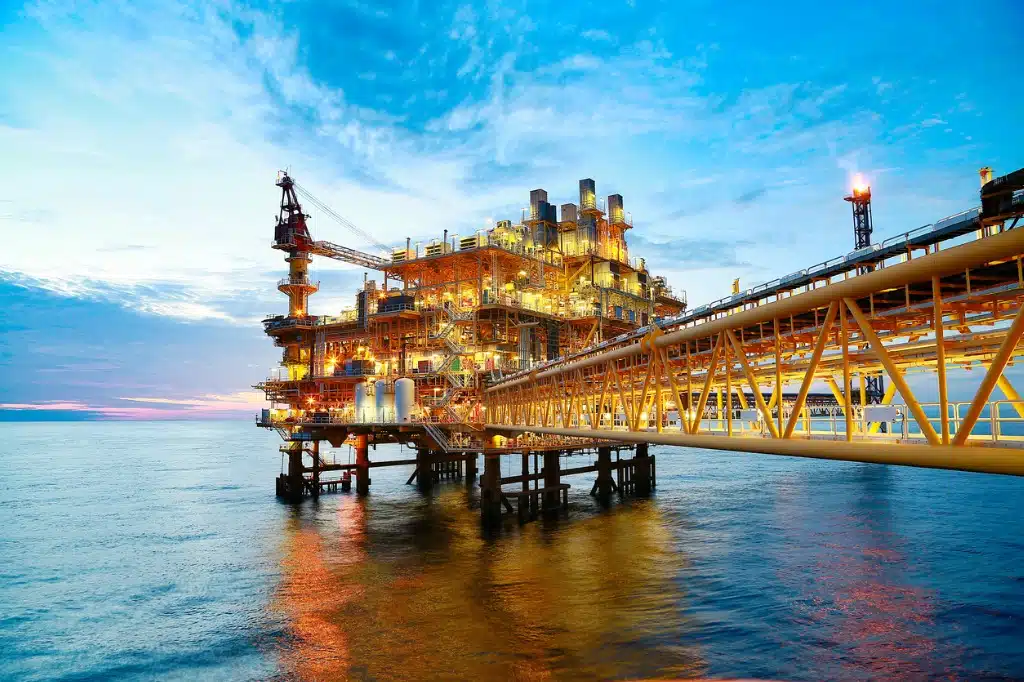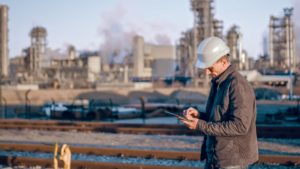
Use of Robotics in the Oil and Gas Industry

Robotics usage has increased significantly over the last several years, thanks to advancements in drones and other similar technologies. Many industries use robotics to increase productivity and improve working conditions, and the oil and gas sector is no exception. Oil and gas companies can utilize robots to automate repetitive and dangerous tasks, eliminate inefficiencies, reduce industry-wide costs, and increase profit margins.
Robotics and automation significantly benefit the production phase of oil and gas operations. You can avoid putting human workers’ lives at risk by leaving dangerous and challenging tasks to robots. For instance, aerial drones and unmanned underwater vehicles can explore areas that are dangerous for humans. Robots can handle crucial processes like underwater welding and repetitive drilling tasks that would otherwise threaten human lives.
Humans utilizing robots to accomplish dangerous tasks instead of performing the tasks themselves is far more commonplace now than ever before. Robotics reduce the chance of injury during most phases of oil and gas production, including exploration, drilling, production, operations, and even de-commissioning.
Benefits of Using Robotics
Robotic technology can benefit oil and gas companies in several ways, including the following.
- Robots eliminate safety hazards
- Robots reduce operational costs
- Robots increase productivity
They Eliminate Safety Hazards
You can use remote-controlled robots to accomplish dangerous drilling tasks and eliminate the risks of humans doing these tasks. For example, robots can inspect offshore sites using sensors and create 3D maps of the environment so that humans can safely navigate these environments.
Robots like these move around on four legs and use microphones and visual and thermal cameras to obtain information. They also use gas detectors and thermal cameras to assess the viability of such locations. Robots eliminate the risks associated with humans inspecting the sites, as they can control these robots remotely.
Roughnecking, a term used to describe hard manual labor, is one of the most dangerous jobs across all industries. Some robots eliminate the need for human roughnecks, which minimizes deaths, injuries, and losses associated with roughnecking.
Roughnecking robots can install drill pipes in complex environments, such as oil-bearing rocks and even out in the ocean. These efficient robots make life much easier for oil rig workers who no longer have to put their lives at risk to supply consumers with oil.
Robotic technology has advanced so much that it is now possible to automate entire oil rigs, eliminating the need for humans to live and work on these rigs. There is a prominent offshore oil and gas platform located in the hazardous North Sea, but you would see no humans operating it if you were to visit the platform, thanks to robot technology. People visit the platform once or twice a year, but they never stay long because there’s no need for them to do so.
Some advanced robots work underwater to carry out maintenance tasks and assess repairs. Robots like these have docking stations, and workers can control them remotely from the rig. They have snake-like bodies that can move through the water easily, reaching areas impossible for humans to access.
Underwater robots have modular designs that you can customize to perform an array of vital tasks. Some of these robots move using an Ethernet connection, making them controllable by humans located anywhere on earth.
These robots can perform inspections in such a way that does not harm the environment. They use a self-contained battery system that requires no parent ship and has a relatively small carbon footprint. Using underwater robots to conduct inspections helps companies minimize accidents and avoids the need for humans to carry out these inspections.
They Reduce Costs
Robots lower operational costs because there is less need to install safety measures. Since human employees are not involved, there’s no need to equip robots with extensive safety features. Since robots can take care of most redundant and repetitive tasks, human employees can work on more value-added functions.
Another way you can lower operational costs is to establish robotic platforms with no human attendants. Robotic platforms eliminate the need to provide housing, food, heating, cooling, and extra safety features. You can save a lot of money by not paying for expensive safety gear, and robots require no work breaks or benefits.
They Increase Productivity
Many of the most advanced robots carry out tasks far more efficiently than humans can. For example, robots are far better at performing inspections than humans are. This doesn’t mean that humans are completely out of the picture; it just means that humans can operate the robots at a safe distance and out of harm’s way. For example, drones can inspect rigs from above, which would be very dangerous for a human worker.
Robots also decrease the amount of downtime during and between work tasks. Downtime can be extremely costly on oil and gas platforms, and you must take measures to minimize it. Drilling sites and oil rigs benefit in several ways when robots perform essential tasks. We do not doubt that robotic usage will continue to increase in the oil and gas industry as the available technology increases.
Become a Member of COPAS
COPAS is the Council of Petroleum Accountants Societies. Members of COPAS are at the forefront of driving change and innovations that shape accounting in the petroleum industry.
By becoming members of COPAS, petroleum accountants societies gain leverage in the industry, increased knowledge and insight, and a platform to collaborate with like-minded professionals. Outpace the rest and learn more about the oil and gas industry’s best accounting practices, standards, and guidelines by joining COPAS.
We established our Accredited Petroleum Accountant® (APA®) program in 1996 to certify accountants within the oil and gas industry. It ensures that petroleum accountants are proficient in the basic elements of knowledge essential to oil and gas accounting. Reach out to us if you are interested in becoming a member of COPAS!
COPAS POLICIES: Complaints | Cancellation & Refund Policy


















